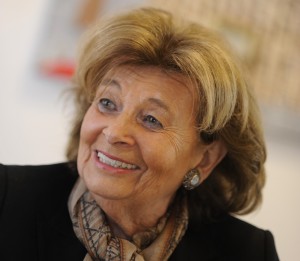
Already at the age of 15 Charlotte knew what she wanted from life: to marry tall, handsome Samuel Knobloch, a survivor of concentration camps, whom she had just met. She wanted to be a good wife and raise their children. “His dark brown eyes were so kind, so warm – I knew right away that he was the one for me,“ reminisces the now 80-year-old lady with a radiant smile whilst tears are sparkling in the corner of her bright green eyes.
The teenager did not take heed of her father, Fritz Neuland, a strict man, a lawyer and Bavarian senator, brushing off his daughter´s intentions as “silly daydreaming”. What proved more tricky, however, was to make Samuel, in his mid-twenties then, take notice of the young Jewish girl from Munich. But neither of the two men – whose characters could not have been more different – had reckoned with Charlotte’s will power. As soon as she turned 18, she married the man of her dreams. All his life, she was a good, a loyal and strong wife to Samuel Knobloch and a loving and supportive mother to their two daughters and their son.
In her spare time she began visiting the old age home of Munich’s Jewish community: “These people had survived the worst, they were broken, alone, desperate. They had lost all their nearest and dearest. I just had to look after them.” When her children had left home, Charlotte Knobloch joined the official ranks, soon the board of the Jewish Community in Munich. In 1985 she was elected Chairperson of the Kultusgemeinde. The first woman at the head of a large Jewish community in Germany. She asked the rabbi and her husband whether to accept the vote. Both agreed. Charlotte Knobloch has been in office ever since.
With boundless energy, discipline, firmness coupled with irresistible charm and most of all humanity Mrs. Knobloch looks after her community: She has helped to integrate immigrants from the former Soviet Union, seen to the Jewish kindergarten and school, the old peoples’ home – never from behind her desk, but hands-on. And she has made sure that the Munich community has returned right into the heart of the city – not just symbolically but with an outstanding architectural ensemble. On 9 November 2006 she inaugurated the synagogue Ohel Jakob, the Jewish Community Center and the Jewish Museum at Munich’s St. Jakobsplatz. “Building – staying – belonging. Now, after all these years, I knew I had finally arrived and that I wanted to stay,” is how she remembers that day.
9 November – 68 years earlier: Charlotte holds on tight to her father’s hand. They are rushing through Munich. Seeking shelter. Past the burning synagogue, past looted shops, shouting SA men. Munich is no longer home.
Her beloved grandmother is deported. Her father knows he can no longer protect the girl. A former maid of the Neuland’s takes her to her parents’ farm, claiming Lotte is her illegitimate child – a scandal in rural Catholic Bavaria!
1945, after the liberation by the U.S. army, back in Munich, all she wants is to leave. As a young married couple, the Knoblochs are set on emigrating to the States. But somehow they stayed.
In 2006, Charlotte Knobloch was appointed – again the first female – President of the Central Council of Jews in Germany. She continues to serve as Vice President at the European Jewish Congress and the World Jewish Congress. She has received countless German and international honors, including an honorary doctorate from Tel Aviv University. The patron of Germany’s scholarship program for excellent Jewish university students, she kvells over the gifted young people who grow to become pillars of the Jewish community. Her life’s motto? “Always ask yourself what you can do for others.” Charlotte Knobloch is a mentsh.
